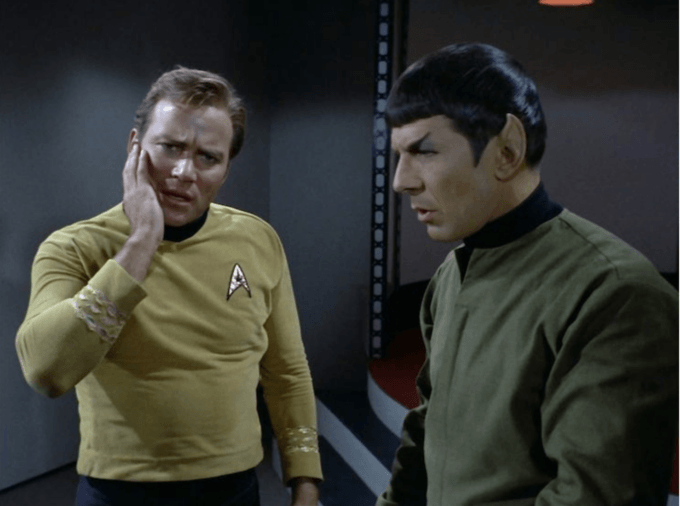
Still from This Side of Paradise episode of Star Trek.
For those of you who have followed my work here on CounterPunch, you should know that in addition to being a military researcher, author and freelance writer, I am also Korea’s first Star Trek professor. For many years I have taught a class called Ethics of the Future: Analyzing Science Fiction Films, and my focus has been Star Trek: The Original Series. I have received endorsements from Susan Sackett, Ralph Senensky, and Mark A. Altman, all of whom are at the top of the Star Trek hierarchy of experts, and been profiled in The Official Star Trek Magazine. Hopefully that gives me a little credibility.
One of my favorite episodes of TOS is “This Side of Paradise”, the episode in which the crew is infected by spores that produce unqualified happiness and cause them to abandon the Enterprise, with the exception of Captain Kirk. The purpose of this short article is to dispute a chapter by David Kyle Johnson in the book Star Trek: The Ultimate Philosophy called “Destroying Utopias: Why Kirk is a Jerk”. Johnson begins by saying: “The spores that saved the colonists from Berthold radiation also provided perfect health and happiness. Instead of being dead, the farmers were gleefully working the land to produce the food they needed and living wonderfully happy lives. Kirk’s response is telling: ‘We weren’t meant for that, none of us. Man stagnates if he has no ambition, no desire to be more than he is.’ Elias Sandoval, the colony leader, claims that they have everything they need. ‘Except a challenge,’ Kirk replies—so, bye-bye spores!”
He continues: “While Kirk must also save his command from his spore-infected, mutinous crew, he makes it clear that he would’ve rid the colonists of the spores regardless: ‘Maybe we weren’t meant for paradise. Maybe we were meant to fight our way through. Struggle, claw our way up, scratch for every inch of the way. Maybe we can’t stroll to the music of the lute, we must march to the sound of drums.’ Once spore-free, even Sandoval agrees: ‘We’ve done nothing here. No accomplishments, no progress. Three years wasted.’ The lesson is simple: living on a world lacking hardships isn’t an option, because only by struggling can we progress and live up to our potential.” So far, so good. This is what happened.
But then Johnson then proceeds to attack Kirk’s character while ignoring important dialogue. “… the value of a farming life on Omicron Ceti III is too readily dismissed. Sandoval says they weren’t able to complete the work they set out to do: ‘We wanted to make this planet a garden.’ But isn’t that what they did? Even if they originally intended to export food, why shouldn’t people seeking the simple, happy lifestyle guaranteed by the spores be allowed to do so? What right does Kirk have to decide, for everyone, that such a life isn’t worth living?” Kirk had every right to decide because he had orders from Starfleet Command to evacuate the colony. And he told Sandoval that it was “not an arbitrary decision’” on his part. While the spores were protecting the colonists from radiation exposure, what guarantee did Starfleet Command have that the spores would always do so? Starfleet was being cautious as it was dealing with many unknowns on the planet. Who is to say the spores would always be benevolent or that their effectiveness might not diminish over time, as the colonists became dependent on and tolerant of their effect, like prescription medication that no longer works? Contrary to what Johnson says, there were no “guarantees”. Kirk does not always follow orders, but he always has a compelling ethical reason to disregard them. In this case he happened to agree with the orders, and he was just doing his duty. Kirk was definitely not a jerk in this episode, and even If somebody was being a jerk, it was Starfleet Command!
NOTES
Kevin S. Decker. The Ultimate Star Trek and Philosophy: The Search for Socrates (The Blackwell Philosophy and Pop Culture Series). Wiley. Kindle Edition.